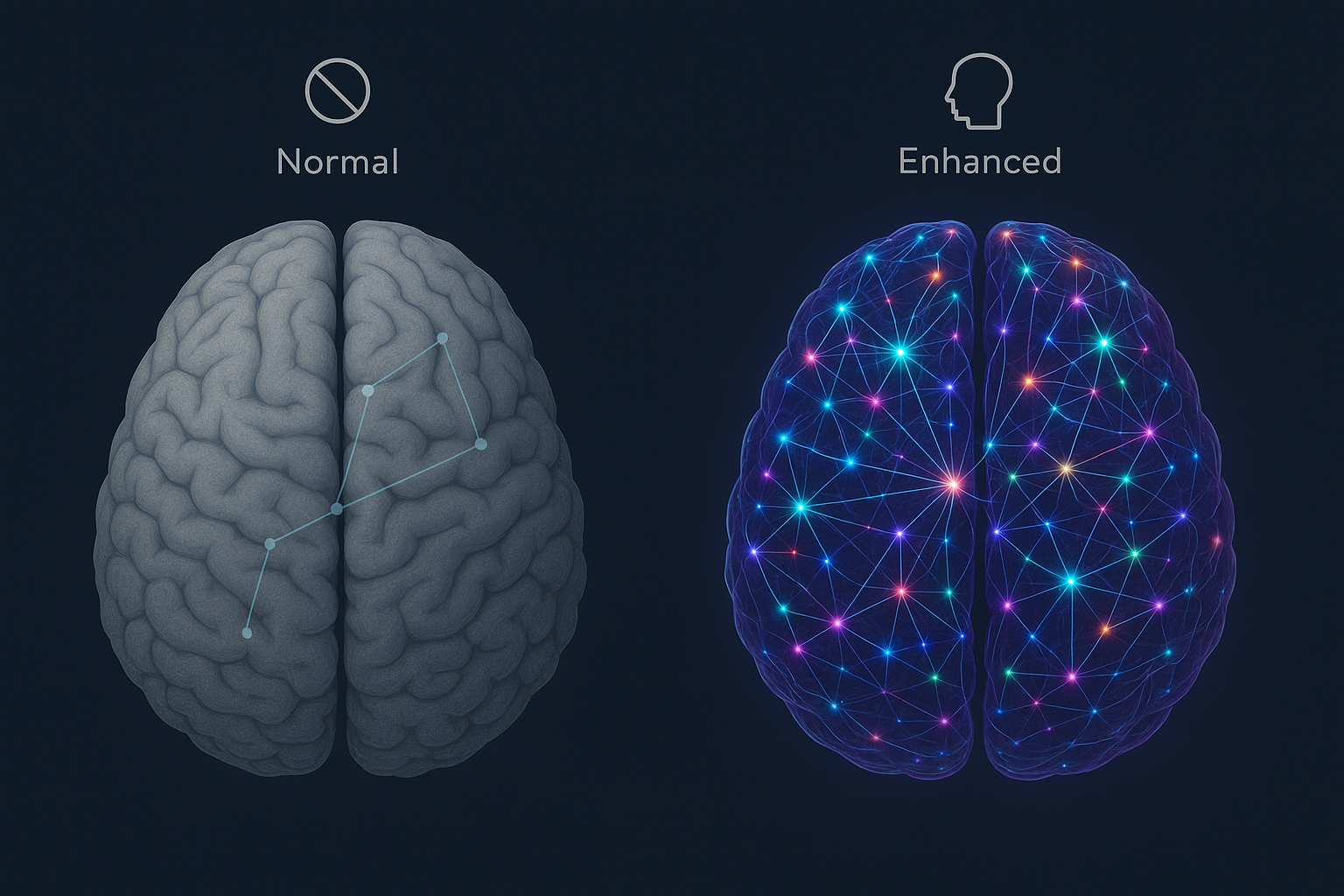Psilocybin—the psychoactive compound found in magic mushrooms—has sparked scientific curiosity for decades. As research accelerates, we’re learning more about its profound neurological effects. Psilocybin not only alters perception but fundamentally changes how the brain communicates with itself.

What Is Psilocybin?
Psilocybin is a tryptamine compound that converts into psilocin in the body. Psilocin binds primarily to serotonin 5-HT2A receptors in the brain, disrupting standard neural signaling and inducing altered states of consciousness.
This biochemical transformation is critical to understanding how psilocybin works. Once psilocin engages these receptors, it initiates a cascade of effects that ripple across cognition, emotion, and sensory processing.
How Psilocybin Affects the Brain
1. Default Mode Network (DMN) Suppression
The DMN governs self-referential thought and ego identity. Under psilocybin, activity in the DMN is significantly reduced, correlating with the experience of ego dissolution and increased present-moment awareness.
Research Insight:
- A 2016 fMRI study published in PNAS showed that psilocybin reduces DMN integrity and increases interconnectivity between brain regions (source).
Reduced DMN activity may also help break cycles of rumination common in depression and anxiety. This allows individuals to step outside their habitual thought patterns and engage with new perspectives.
2. Increased Global Brain Connectivity
Psilocybin increases communication between brain networks that don’t typically interact. This is often visualized in connectome maps that show a more “globally integrated” brain state.
This integration fosters novel thought associations and enhanced creativity. It’s also believed to underpin the vivid visuals, synesthesia, and emotionally charged insights reported by users.
3. Neuroplasticity and BDNF
Emerging studies suggest that psilocybin boosts levels of Brain-Derived Neurotrophic Factor (BDNF), a protein linked to neurogenesis and synaptic plasticity.
Potential benefits include:
- Enhanced learning and memory
- Improved emotional regulation
- Rewiring of negative thought patterns
These neuroplastic effects offer a powerful foundation for therapeutic change, particularly when combined with integration and psychotherapy.
Therapeutic Implications
Understanding the neuroscience of psilocybin has fueled its use in mental health treatment. Psilocybin-assisted therapy is showing promise in:
- Treatment-resistant depression
- PTSD and anxiety
- Addiction (alcohol, nicotine)
These effects are likely due to the compound’s ability to disrupt rigid brain patterns and allow new pathways to form.
In clinical trials, participants often report a profound shift in perspective that persists for months. This is believed to be a result of long-lasting changes in connectivity and emotional processing.
Common Misconceptions
- “Psilocybin fries your brain.” In reality, it promotes healthy rewiring and neurogenesis.
- “It works like antidepressants.” Unlike SSRIs, psilocybin doesn’t blunt emotions but allows suppressed experiences to surface and be processed.
- “It’s addictive.” Psilocybin does not activate the brain’s dopamine reward circuitry, and evidence suggests it has a very low potential for dependence.
FAQs
Q: Is psilocybin neurotoxic?
A: No. Research shows no evidence of neurotoxicity at therapeutic doses.
Q: Can it improve brain function?
A: Some studies suggest lasting improvements in creativity, emotional resilience, and openness.
Q: Are effects the same for everyone?
A: No. Effects vary based on dose, set and setting, and individual brain chemistry.
Q: How long do brain effects last?
A: Neural changes can last weeks to months, depending on the depth of the experience and integration practices.
Conclusion
The neuroscience of psilocybin reveals a compound capable of rewiring thought patterns, dissolving ego, and opening new pathways for healing and cognition. As scientific understanding grows, so does the potential for safe, regulated therapeutic use.
Ongoing brain imaging research and longitudinal studies will continue to reveal the depth of psilocybin’s impact on neural plasticity and psychological well-being.
Explore more:
- Psilocybin vs Psilocin: What’s the Difference?
- Are Psilocybin Mushrooms Addictive? Use vs. Dependence
Cross Promotions:
Looking for Clones? www.kingkongclones.com
Want Personal Flower? www.packtrapper.com
Need Bulk Flower? www.trapgods.io
Need Breeder Seeds? www.neptuneseedbank.com

